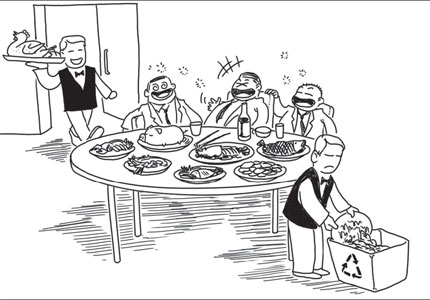
 |
| Illustration by Zhou Tao (Shanghai Daily) |
It'S that time of year again, the time of lavish banquets and wanton waste.
More than a week ago, Xinhua published a photo that captured the extent of profligacy at a banquet in Qingdao, Shandong Province.
In the picture, sumptuous food is piled high on plates spread over an oversized table. At first sight, readers would mistake the scene for a feast about to begin.
But the caption tells a different story. Rather than freshly served dishes, the food is actually leftovers. Some dishes are barely touched, so they retain the shape in which they arrived at the table. For instance, a steamed bass is only missing a few morsels.
Shanghai Morning Post reported on January 23 that every year Chinese throw away food worth 200 billion yuan (US$32 billion), enough to nourish 200 million people.
According to data released by the UN Food and Agriculture Organization in June, the food that heads to the dump worldwide amounts to 1.3 billion tons every year, a fourth of which could have fed 900 million hungry people.
The contrast between China as a major food squanderer and a developing country where poverty hasn't been fully eradicated is deeply unsettling, and should induce some shame.
As a member of the post-1980s generation, I grew up being taught that every grain of rice represents a farmer's great labor and waste begets divine punishment.
In less than two decades, a nation that once prided itself on thrift has developed its equivalent of the throwaway culture prevalent in some Western nations.
Although none of us is free of responsibility, some people obviously shoulder more blame than others for waste.
The happy days of these gourmets will presumably be over, now that the country has initiated a crackdown on feasting at public expense.
A civil servant friend told me that for all government employees, the annual rite of nian ye fan is canceled this year, nian ye fan being a mass banquet to celebrate the Spring Festival, funded with public money.
What's more, he and his boss have to pay for their daily meals if the bill exceeds their per diem. In the past, the costs incurred were reimbursed with tax money.
At long last, the perfect storm started by recent decrees from the new supreme leadership calling for frugality appears to be gaining momentum.
Except for a few cunningly hiding their gluttony in secluded, exclusive clubs, many officials are wary of being spotted dining with gusto at this sensitive moment.
Some have even come to so abhor banquets that one of them, a deputy bureau-level official in Henan Province, recently complained to the media that after consuming abalone for several consecutive days, he dreamed about having millet congee.
By many indications, wining and dining is encoded in our national DNA, and in contrast to what some observers say, it is not just a privilege of the upper crust. Economist Liang Xiaomin argued a few years back that China's Engel's coefficient, an index of food consumption as a share of household expense, hasn't declined as in most countries as living standards improve. Instead, it grows, or remains steady, but seldom drops.
Bitter memories of famines and hunger go a long way toward explaining this statistical anomaly, but waste has deep cultural roots. Much of the food waste boils down to a matter of face, since a table groaning with pricy and fancy foodstuffs signifies the host's status and prosperity. Indeed, banquets sometimes are arenas for flaunting wealth.
While some civil servants' hushed grousing over the cancellation of nian ye fan is occasionally heard - it does dampen the festive atmosphere - the banqueting cutback is actually a daring move worth pursuing. If it lasts, it can set a precedent that nothing, not even the symbolic feast many take as a given, can stop the war on waste and pomp.
Two decades ago, before the birth of nian ye fan, all that employees received as year-end benefits were just gift packs, and nobody voiced any complaint.
There is no endless banquet, goes the famous Chinese saying. At this point, we don't need to whine about a few banquets less. There are too many of them that should have ended long ago.
















 Highways go toll-free for passenger cars during holiday
Highways go toll-free for passenger cars during holiday


![]()
